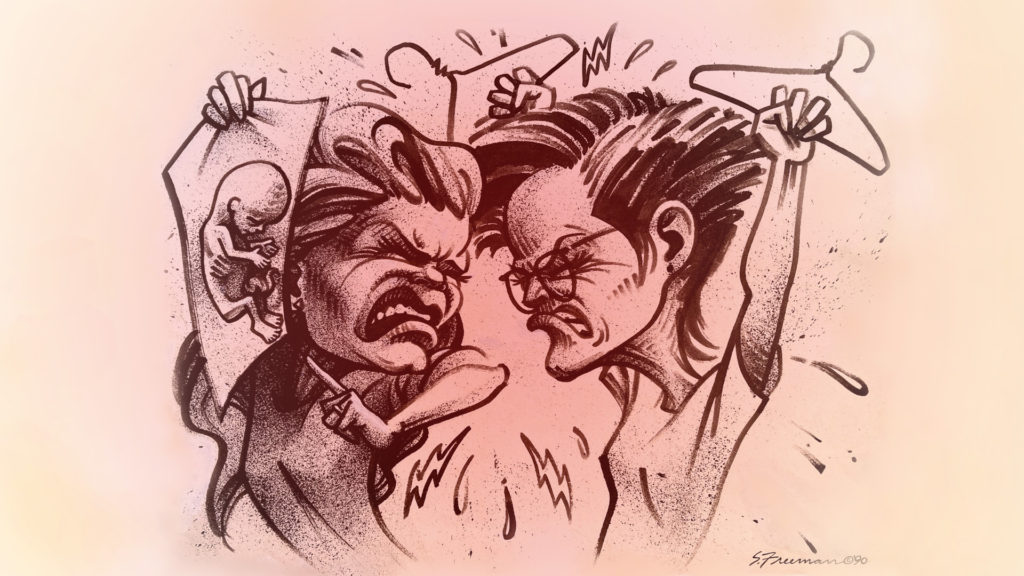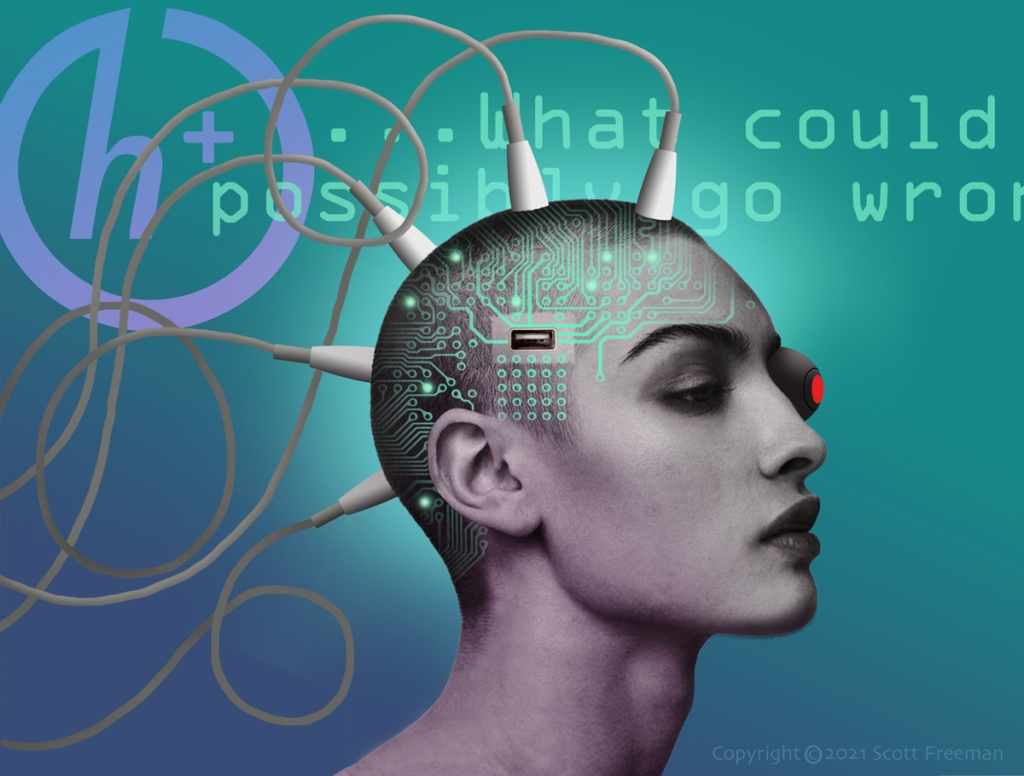
I’m going to present to you a rationale for compromising on pro-life public policy from a biblical perspective. It’s a rationale I don’t recall hearing in my 40 something years as a conservative evangelical pro-life person. If you consider yourself to be pro-life, I’d like to hear what you think.
First, I should probably give you my pro-life creds. It was during my art college years, (1978 – 1982), that I first thought much about abortion as a social and human rights issue. I was smack in the middle of the religious right push to rally the church around the issue of abortion during the late 70s. The works of Dr. Frances Schaeffer, (now deceased), and his angry son Franky, (now an ex-evangelical), were highly influential for me.
For several years I regularly picketed my local Planned Parenthood clinic, as well as an occasional independent abortion clinic. During the “Summer of Mercy” (1991) organized by Operation Rescue, I was arrested along with a group of other pro-life activists at that same Planned Parenthood for a planned, peaceful act of civil disobedience. By design, we were dragged, one by one, to a paddy wagon and put in jail for locking arms and sitting quietly in front of the entrance of the clinic.
So I got to see the pro-life movement up close. I had a lot of invigorating conversations with pro-lifers of differing backgrounds from mine, as well as with the ever-present counter-protesters. I had a life-changing conversation that I still remember with a brilliant young woman from Feminists for Life. I still smile at the memory of two blonde, articulate, regular female protesters, who had a commanding presence and were always joined at the hip, and whom the counter- protesters nicknamed “the Barbie Dolls from Hell.”
I got to see first-hand that the oft repeated media accusations against pro-lifers are not true: accusations that pro-lifers don’t care about life once it is out of the womb. That pro-lifers don’t care about women. That the pro-life movement is driven by men, and so on. These were compassionate people who lived out their convictions.
I tell you all of this to show that I have been ardently pro-life for my entire adult life, and continue to be so. I believe that upholding a belief in the sanctity of human life for all people is good for all people. (No, I am not in favor of capitol punishment, btw.)
I know the pro-life arguments around the hard cases regarding abortion – life of the mother, rape and incest, and severe fetal deformity/disease.
The proposed exceptions
These exceptional cases bring us to the question of compromise. Since the overturning of Roe, mainstream pro-life organizations have been speaking of “an abortion free America” and “a total ban on abortion.” I understand where they’re coming from. If abortion is the taking of an innocent human life, which it demonstrably is, then there can’t be room for compromise.
But, what if God thinks otherwise?
Evangelicals believe in a God who is love (1 Jn 4:16), a God who “is light and in Whom there is no darkness at all” (1 Jn 1:5), a God who created male and female as equals in His image (Gn 1:26,27), Who “takes no pleasure in the death of the wicked, but rather that they should repent” (Ez 18:23, 32; ch 33:11), who created the ideal of lifelong, faithful, monogamous, marriage (Gn 2:23-25; Mt. 19:3-6).
So, hypothetically, if such a God were to deliver a body of public policy to a nation of people, He wouldn’t compromise on what He knows to be right, would He?
Except that, if you think about it, that’s exactly what he did when he delivered the 10 commandments and the Torah to the Hebrew nation under Moses. The Torah contains several concessions. Jesus spells one out here: “Because of your hardness of heart Moses allowed you to divorce your wives, but from the beginning it was not so.” He’s explicitly allowing a concession around a right and good ideal because of mans’ brokenness.
I contend that the Torah is not an expression of God’s ideal. The ideal expression came with Jesus and the New Covenant – you have heard it said…but I say to you: “You have heard that it was said, ‘You shall not commit adultery.’ But I say to you that everyone who looks at a woman with lustful intent has already committed adultery with her in his heart.” Hold on to that particular thought for a moment.
This idea is not widely understood. I get flak for this all the time in my conversations with atheists and “skeptics.” In the Torah they think they see God condoning male sexism, slavery, xenophobia, and genocide. If God is so good, they say, then why did He hand deliver such an inferior body of law to His people? The Freedom From Religion Foundation could do better than that. Supposedly.
Well…why would a compassionate, holy, and just God compromise His standards with fallen people?
I’m sure the answer is multi-faceted, but the obvious one to me is that the Hebrew nation couldn’t have handled a higher standard, so God gave them a low bar. If God were to remain just, demanding obedience to the highest bar would’ve wiped the Hebrews out. Can you imagine – “if you even look at a woman to lust after her you are liable to judgment”? Not committing adultery was at least possible for them. As it was, the nation failed miserably to obey God’s Torah for much of its history, even given a law containing concessions.
Before Moses and the Torah, the Hebrew nation was enslaved for 400 years to an idolatrous nation that served a pantheon of gods. This was all Moses’s generation had known apart from whatever slivers of oral tradition around YHWH may have survived within the enslaved population. The Hebrew people who received the Torah from God were unregenerate, were not born again, did not have the Spirit of God dwelling within them. That would all come later when Jesus would eventually establish a better covenant, a better salvation, and a better kingdom based on better promises, and a better torah. (“Torah” literally means “instruction.”)
This is my rationale for compromise today. Let’s apply it to abortion policy in America.
I believe the pro-life position to be correct and good. It’s certainly best for innocent life in the womb, but also arguably for women and society as a whole. But we are now charged with coming up with public policy that must apply to a diverse population of people, many of whom do not hold to a pro-life ethic. Furthermore, law demands compliance, and consequences for failure to comply. I’m arguing that we need to set the bar lower than “an abortion-free America.”
In my opinion, post Roe, abortion should be allowable in 3 exceptional cases. In each of these cases, the mother will have had no say in some aspect of her pregnancy. Therefore, compromise is justifiable. Let’s look at each case.
When the pregnancy endangers the life of the mother
This one is a no-brainer. Abortion has always been allowed to save the life of the mother, and pro-life groups argue that this is still the case today, post-Roe, in every state despite what some media claim. The pro-life position has never been that the life of a developing fetus takes precedence over the life of the mother, but that the rights of both should be considered.
In cases of pregnancy resulting from rape and/or incest
I understand the pro-life arguments against abortion in this case – that the resulting new life is not at fault; that two wrongs don’t make a right, and so on. I have a friend who describes himself as “the product of a rape.” He has a lovely family now and is happy to be here.
Nonetheless, the reality is that if a woman can be forcibly made pregnant, and then by law cannot terminate that pregnancy, then we truly are mandating forced pregnancy. I don’t see justice for the woman in that. For those women who choose to carry such pregnancies to term for the sake of the developing baby inside of them, they are remarkable human beings choosing extraordinary compassion and self- sacrifice. But I think it is too much to ask that women should have no choice in such a situation.
In cases of severe fetal deformity/life threatening disease
Again, I understand the arguments. But again, I think forcing compliance is asking too much of women who do not agree with those arguments. There are a number of fetal diseases that usually result in the death of a developing baby before, during, or shortly after birth.
I have supported and watched a mother who is very close to me carry a baby diagnosed with trisomy 18. We all hoped and prayed for a miracle. She carried the baby for 20 weeks, and then delivered a stillborn son. I watched her and her husband humanize and dignify this baby’s short life by naming him, holding him after birth, weeping over him, and eventually scattering his ashes in the mountains. I think what she did was amazing, right, and beautiful – tragic though it was.
This woman had a supportive husband and extended family in addition to her faith and pro-life convictions. But I think it is too much to ask to force all women, even those who may not believe in miracles or who may be in difficult circumstances, to comply with a total abortion ban in cases like this.
Conclusion
I am not advocating compromising one’s own pro-life position here. The question here is about setting a lower bar regarding public policy for the diverse, general population. Kinda like God did with the Hebrews. Allowing abortion in these difficult situations does not require abortion for those who hold to an uncompromising pro-life ethic. It does not militate against a culture of life. It does seek to balance the interests of girls and women with the interests of their developing offspring.
There is nothing else like pregnancy in terms of what it requires of an individual. An unplanned pregnancy in and of itself is a life-altering undertaking, even without abusive or life threatening circumstances surrounding it. Few woman would choose a life-threatening pregnancy, non-consensual sex, or a life-threatening diagnosis for her developing offspring. While it is indisputable that a new human life begins at conception, it is a justifiable compromise that women have the option to end a pregnancy in these situations.
I am very interested in hearing your comments below.
(Here is the link to my new rebuttal video to, “The History of Abortion,” in case you missed it):
https://youtu.be/JLvniDOrQgo






